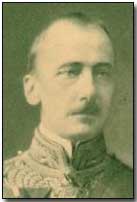Who's Who - Ottokar Czernin
 Ottokar, Count Czernin Von und zu
Chudenitz (1872-1932) served as Austro-Hungarian Foreign Minister from
1916-18, appointed with the arrival of
Karl I to the throne
following the death of Emperor
Franz-Josef.
Ottokar, Count Czernin Von und zu
Chudenitz (1872-1932) served as Austro-Hungarian Foreign Minister from
1916-18, appointed with the arrival of
Karl I to the throne
following the death of Emperor
Franz-Josef.
Born on 26 September 1872 in Dimokur, Bohemia (now part of the Czech Republic) to a noble family, Czernin entered the diplomatic service in 1895 with an appointment to Paris. Four years later he was made charge d'affaires at The Hague.
Czernin was elected to the Bohemian Landtag in 1903 where he espoused his naturally conservative political outlook. Among other policies he came out in opposition to the adoption of universal suffrage in 1907; a close friend of Archduke Franz Ferdinand, Czernin remained firm in his belief in the benefits of aristocratic government.
Given lifetime membership in the upper chamber in 1912, Czernin returned to the diplomatic service in 1913 with his appointment as Austro-Hungarian ambassador to Romania, coinciding with the Balkan Wars.
With war declared against the Entente Powers in August 1914, Czernin was active in lobbying the Romanian government to maintain her policy of neutrality. In pursuance of this aim Czernin attempted (unsuccessfully) to persuade Franz-Josef to cede territory to Romania to secure the latter's benevolent neutrality.
As it was, Romania - under Ferdinand I - finally entered the war on the side of the Entente Powers against Germany and Austria-Hungary in August 1916. With this declaration of war Czernin returned to Vienna.
Shortly after his return home Czernin was appointed Foreign Minister by the newly crowned Emperor, Karl I, succeeding Istvan Burian on 22 December 1916.
Although a supporter in Germany's aggressive policy of unrestricted submarine warfare, Czernin was clear in his belief that Austria-Hungary needed to disengage herself from the war in order to prevent the complete disintegration of the Habsburg monarchy. In this he found himself in concurrence with his Emperor.
However Czernin proved unable to disentangle Austria-Hungary's economic and military dependence upon Germany. Already politically damaged as a consequence of territorial concessions to Ukraine arising from the Treaty of Brest-Litovsk in March 1918 (click here to read Czernin's official reaction to news of the settlement), Czernin was forced from office in the wake of the so-called 'Sixtus Affair' of April 1918.
In this, French Prime Minister Georges Clemenceau's revelation of Czernin's role in the secret Austrian-Allied negotiations of March 1917 (initiated by the Emperor) destroyed Czernin's remaining political credibility. Discredited with his German allies, he tendered his resignation on 14 April 1918.
Retired from office and having lost his family estates to the newly created Czechoslovakia, Czernin served as a member of the national assembly from 1920-23 during the first years of the new Austrian republic.
He died on 4 April 1932 in Vienna.
The Russian war ace Alexander Kozakov claimed 20 victories during the war; his nearest compatriot, Vasili Yanchenko, claimed 16.
- Did you know?
